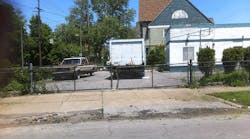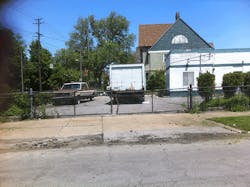In a blog post this week, Associate Editor Ginger Christ wrote about the recent NASCAR crash in which a car racing at 190 mph crashed and went airborne. Fortunately, the car was caught in netting that rings the track for just that reason, but several bystanders were hit by debris. The scene more resembled a demolition derby than a NASCAR race.
I write a lot about my neighborhood in Cleveland: our community gardens and efforts to beautify the neighborhood, how the national news misrepresented our neighborhood (with the help of my councilman) during the rescue of three women held hostage in a nearby home, driving on our pothole-riddled roads, etc.
One of the most recent issues that we – the collective “we” of residents, business owners, city administrators and investors – are facing is the fact that so many homes and storefronts and commercial buildings sit vacant, which brings me to a demolition derby of another kind.
In the good old years, Cleveland’s population was double (or more) than it is now. The city was a steel and manufacturing boom town. And like many similar cities, the bottom dropped out of our economy and we went from “boom town” to part of the “Rust Belt.”
As if that wasn’t enough, Cleveland was one of the epicenters of the mortgage crisis, which found residents using loans they couldn’t afford to pay back to purchase homes they couldn’t afford when manufacturing and steel jobs were lost and double-income homes became single-income homes.
While Cleveland doesn’t have it as bad as say, Detroit, it’s still bad. There are some neighborhoods in the city that have more vacant lots and vacant homes than there are occupied homes. Entire city blocks in what once were vibrant commercial areas sit empty or worse; are filled with phone stores, dollar stores or strip bars. People have walked away from homes and buildings they were once proud to own, unable to pay underwater mortgages on homes and buildings devalued by as much as 50 percent.
Since 2005, some 8,000 distressed properties have been demolished in Cleveland at a cost of around $10,000 each. There are at least that many more that need to go and every year, more are added to the list.
My home is 125 years old and my street is a stable one, with no vacant properties (though several need some work) and no vacant lots. The homes generally are well-tended, neighbors know each other and the kids are respectful. But walk a block over and it’s like walking into a different neighborhood in a different city: several vacant lots, kids hanging around looking sullen, panhandlers, broken-down cars…you get the picture.
Our local “entertainment weekly” recently published an article about a property assessment survey that’s underway and the condition of Cleveland’s housing stock. Writer Sam Allard noted, “A policy paper on land banks published by the Federal Reserve Bank of Cleveland in January 2009 claimed that fires in vacant structures cause millions of dollars in damage every year. But even more importantly, vacant properties signal the decline of a neighborhood; they ‘undermine a neighborhood's sense of community and discourage further investment.’”
I would argue that what we’ve seen in my neighborhood isn’t necessarily a lack of investment, but an influx of the wrong kind of investment: Investment that preys on poor people. Stores that sell cans of beer, single cigarettes and lottery tickets; that purchase vouchers for baby formula from mothers for a few cents on the dollar and then turn them in for the full price; that sell milk that is a day or two away from spoiling and have no interest in selling anything close to healthy food. (Which has led to my neighborhood and others being classified as “food deserts.” You can buy a Big Mac within walking distance but you can’t find a bag of apples to save your life.)
Often, these store owners own other small businesses in the neighborhood – gas stations or sandwich shops – and often homes. They live in upscale suburban areas, however.
There’s one such owner in my neighborhood, Tony. He claims he’s misunderstood. That he has the best interest of the neighborhood at heart and that he’s made a significant investment in the neighborhood. I don’t argue that he has made a significant investment; he’s purchased properties, after all. But his investment has added nothing to the neighborhood and A LOT to his bank account.
Residents can point to the homes he owns because they are the worst ones for several blocks. His store is a hangout for neighborhood hoodlums and was the site of a triple murder about 10 years ago. All of his properties are notable for overgrown weeds and garbage.
He recently came under fire because of a long-vacant gas station he purchased on our neighborhood’s main street. A small building from the 1930s or 1940’s surrounded by a large, fenced parking area with a large city landbank lot behind it, the property could be a catalyst for some welcome change. Instead, it sits, becoming more decrepit year after year, because the removal years ago of the old gas pumps and tanks did not remove the pollutants from deep in the soil.
Nothing can be restored or built until the land is cleaned up. Tony has the money to do it, he just doesn’t want to spend it on his “ghetto” property. The original owner, who ultimately was responsible for cleanup, has died and his family has moved out of the country so the EPA’s attempts to collect from him have come to nothing.
Our councilman claims he has two buyers lined up for the property, but Tony doesn’t want to sell. He wants to open an all-night sandwich shop that offers beer and wine until 2:30 am. Again, he wants to pull value from the neighborhood but is not adding anything that is wanted or needed by anyone living here.
At times, Tony has allowed contractor trucks full of debris to park on the lot (as you can see in my photo from a couple of years ago), has allowed it to fill with junked trucks and cars and only seems to cut the grass and weeds when the city threatens to charge him $200 to do it. The breaking point for neighbors came when he pulled a bunch of trash and broken video games out of the building and left them sitting outside, surrounded by waist-high weeds – for six months. The councilman’s office did nothing. The city did nothing. Neighbors complained at block club meetings and some even called Tony but nothing changed. But we didn’t give up.
About a week ago, a television news reporter showed up to interview a resident from another part of the neighborhood for a story about streetlights and how much money the city wastes on them. Knowing how hard we were fighting to get the gas station cleaned up, that resident purposefully showed the reporter street lights right next to the gas station and explained that it was a good story too. The reporter took some photos. He asked around about it. He found me and others who were willing to talk about it.
Yesterday, he called the councilman’s office and the councilman called Tony and tipped him off. After six months of dragging his feet about removing the trash and video games and cutting the grass and weeds, Tony literally RAN across the street from his other business and with the help of a couple of employees, went to work on the outside of the building.
Does it look great? No. But it looks 10 times better.
A segment on last night’s news almost guarantees that we will see some kind of movement on that building; whether it’s a reasonable purchase offer that Tony will accept or an offer from the city or state to help with remediation remains to be seen. But something will be done.
And that is why this is my favorite quote and it applies to all situations, off-the-job and on-the-job: “Never doubt that a small group of thoughtful, committed citizens can change the world. Indeed, it is the only thing that ever has.” ~ Margaret Mead
And my neighbors and I will keep changing our world, one corner gas station at a time…

